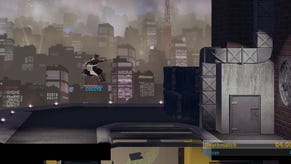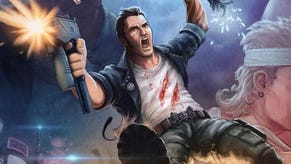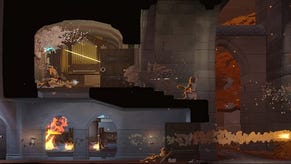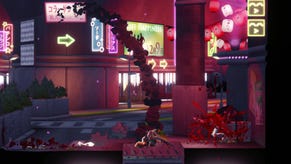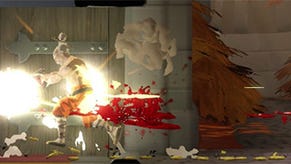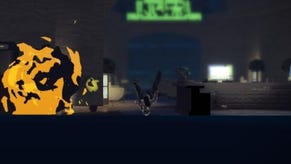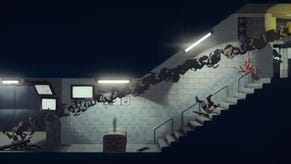Wot I Think: The Showdown Effect
The Next Action Hero?
Congratulations! You made Magicka and have finished creating odd DLC content for the friendly fire(ball) simulation. What do you do next?
1) Go hiking in the Pyrenees.
2) Why not craft some sort of single player Magicka RPG?
3) Form a band sort of like Daft Punk but with all the sci-fi robot vibes replaced by wizard's robes and jokes about willies.
4) Create a fast-paced multiplayer homage to eighties action movies, of course.
If you picked four, you are probably Arrowhead and you have made The Showdown Effect.
The Showdown Effect is both a departure and a continuation of the systems and world of Magicka. What remains is comic chaos, although the carnage is tighter and more controlled than the elemental melting pot of confusion that spilled over to create Magicka's best moments. When my bionic gentleman dives through a window and burts into pieces before he hits the ground, struck by shotgun blasts, pillows and throwing knives, I occasionally feel guilty. I've let my team-mates down.
I consider a session of Magicka to have gone particularly badly if I don't set my closest friend on fire and then explode. If Magicka was a building it'd be the smouldering ruins of an alchemist's lab. The apprentice would be a sizzling circle of fat in the doorway and a charred beaglepuss would bristle knowingly from the centre of the pool. The Showdown Effect would be plastered with neon signs and would have quips instead of windows, but the interior is defined by its carefully crafted lines. The few rooms are precisely constructed and surprisingly clean.
All of the silliness, the spoofing and the riffing, initially works to conceal a delicately poised and surprisingly competitive arena-based multiplayer murder-game. A single bout is over quickly, a blurred ballet of crunching melee attacks and erratic bursts of gunfire, and the score actually matters. When it comes to competitive killing, I’m the worst person to find by your side, usually too busy exploring mechanics to be much use to anyone.
When I say I’m ‘exploring mechanics’, I generally mean I’m seeing how far the constituent parts of my player character will bounce when various weapons deconstruct him or her. If you ever hear me say ‘ludonarrative dissonance’, assume something similar. These are terms I use to shield myself from accusations of being incredibly bad at shooting virtual characters, particularly in cases when those characters are controlled by other people.
I am terrible at The Showdown Effect, is what I’m saying, although I have improved a great deal. Thankfully, I’m not the only person who struggles to stay alive – life expectancy is less than a minute and the last thirty seconds of that esteemed existence will be spent hopping, rolling, diving and dodging, all the while clicking various points on the screen in the vague hope of connecting a blow, or firing a bullet through somebody’s face. The controls aren’t complicated but they are finicky and intentionally so. Melee combat is the simplest way to dispatch opponents because a click of the mouse will turn anything in front of your character into tripe, or at the very least make them bleed a lot and reconsider a frontal assault, but aiming a gun is slightly different.
Bullets strike wherever the cursor is placed, so pointing a gun in someone’s general direction is not good enough. The target has to be directly over them or they’ll escape unscathed. Now, I don’t know if I’ve made this clear already, but every living thing in Showdown Effect’s maps will be bouncing around like a flea that has been feasting on a whippet’s rear end all day. Stand still for more than a few seconds and somebody will kill you. Chances are they’ll kill you even if you’re speeding around the place, self-defenestrating and popping into the odd lift to confuse your pursuers, but to be stationary is to be the largest fish in the smallest barrel. You’re a tuna in a thimble and you better believe it’s tuna season.
Finding a balance between dodging, escaping and attacking is key to success, and it’s the speed and precision of the game that put me in mind of my deathmatch heyday, which occurred in the mid-nineties playing Quake on a LAN. I’d occasionally win a match and feel like a champion, which is more than I can say for anything that’s happened to me since. That’s the appeal of The Showdown Effect – it’s wearing a silly hat and a pair of nonsensical shades, but it’s also finely tuned and though hectic, it rewards a certain degree of patience. I can feel myself improving as I play and that will keep me coming back for a while.
I do wish there was more to go back to though. There are several game modes and they offer a good deal of variety – sometimes you’re in a team, sometimes you’re a solitary target that everybody else is hunting and sometimes the next death is your last – but there are only four maps. Graphically, they are complex and I find the stylised artwork throughout the game appealing, but the areas are small and easy to learn. It’s tempting to say the limited number doesn’t matter because combat is joined so quickly, meaning that only the screen’s worth of space around your character actually matters at any one time, but some of my favourite moments have involved chases back and forth across the entirety of a level’s architecture, waiting for the optimal moment to strike. There’s a great thrill when a pursuer misses a jump by a few inches, slowing them down ever so slightly, but leaving them open to a deadly blow. That’s the best of The Showdown Effect, moments of rapid reappraisal and revenge.
The customisation options are enjoyable, with unlockable hats and other clothing, as well as new weapons and characters. The characters are the most important choice because they all have a special ability, ranging from super healing (everyone has a basic bandaging ability) to grenades and the like. The rest is essentially cosmetic, as are the many weapons scattered about each level, although some do offer increased abilities, blocking bullets or swords with greater efficiency, or in the case of rocket launchers…well, they launch rockets.
I haven’t had any problems with lag, although I’ve seen reports of stuttering which is understandably irritating in such a speedy and tight game. While it hasn’t made me laugh or marvel anywhere near as much as Magicka initially did, this is a game I’ll gladly load up for a twenty minute session most evenings. How long that will last will depend, in part, on how swiftly new content arrives and in what form, but I’m pleased to have such an oddity, a throwback in more ways than one, nestled on my hard drive and I reckon I’ll actually stick with it until I win at least a few matches. That'll be 2015 at this rate.





